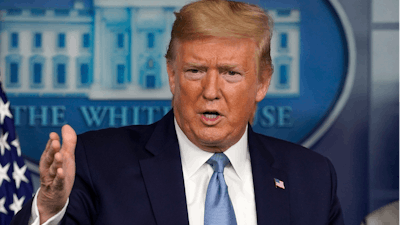
WASHINGTON (AP) — President Donald Trump was focused Tuesday on addressing the devastating impact the coronavirus pandemic is having on the American economy, meeting with tourism executives and speaking on the phone with restaurant executives, retailers and suppliers.
U.S. businesses large and small are reeling from shutdowns, cancellations and public fear about the virus as the number of cases rises nationwide. The administration is expected to propose a roughly $850 billion emergency economic stimulus to address free-fall, which is roiling financial markets. Stocks moved slightly higher on Wall Street on Tuesday, a day after plunging to their worst loss in more than three decades.
The White House request for an emergency stimulus will be outlined to Senate Republicans on Tuesday. It aims to provide relief for small businesses and the airline industry and includes a massive tax cut for wage-earners. Two people familiar with the request described it to The Associated Press on the condition of anonymity because they weren't authorized to speak publicly.
Racing to stall an expected surge of coronavirus cases, the White House on Monday released a series of sweeping guidelines that for the next 15 days will temporarily rewrite the norms of American society.
Trump, employing a newly somber tone about the crisis enveloping the globe, urged all older Americans to stay home and everyone to avoid crowds and eating out at restaurants. The Republican president for the first time acknowledged that the pandemic may send the economy into a recession and suggested that the nation may be dealing with the virus until “July or August.”
The guidelines were released Monday to an uneasy country. The stock market had its worst day since 1987, America's largest school system shut its doors and questions remained about the Trump administration's ability to test for the virus and provide hospital space for those who fall ill.
Among the new recommendations: Over the next half-month, Americans should not gather in groups of more than 10 people, schooling should be at home and discretionary travel and social visits should be avoided. If anyone in a household tests positive for the virus, everyone who lives there should stay home. The administration did not say how old people should be to follow the advice to stay home.
Dr. Deborah Birx, who is coordinating the federal response to the virus, on Tuesday called for the "army of millennials" to lead the charge in fighting back against the coronavirus.
Birx told ABC's "Good Morning America" that the nation needs millennials out doing everything they can to protect themselves from getting infected but also safeguarding their parents and grandparents. She said most millennials who get infected will have mild symptoms and are not as at risk as older Americans. Millennials, a term referring to those born in the 1980s to early 1990s, also tend to be good at networking and sharing information, Birx said.
The president, when asked when the pandemic would subside, said that “if we do a really good job" the crisis could pass by the height of summer. Dr. Anthony Fauci, the administration's infectious-disease expert, did not challenge that claim.
Trump's prediction was far less optimistic than his earlier ones, when he insisted it could be over in weeks. He also acknowledged that the virus may send the nation's economy into a recession, a potentially brutal blow for an incumbent seeking reelection.
That admission was startling for Trump, who for two weeks had struck a discordantly optimistic tone about the pandemic that endangered his presidency. On Monday, that upbeat demeanor was gone as he acknowledged the virus was “not under control” in the United States or globally.
He said he did not yet plan to call for domestic travel restrictions while his administration made pointed appeals to millennials to stop socializing and risk spreading the virus. He was reluctant to advise states to cancel the primary elections ahead. And without providing details, he said “we're going to back the airlines 100%," a note of reassurance for an industry crippled by travel bans and fears of spreading the virus.
The expansive guidelines were issued on a day of fast-moving developments in a capital resplendent in cherry blossoms but awash in anxiety.
First lady Melania Trump took to Twitter to urge Americans to consider “taking advantage of time working from home to connect with your loved ones via email or FaceTime.”
Trump's daughter Ivanka posted a photo on Twitter of a makeshift tent built with bed sheets to allow her and her young children to “camp out” in the living room. She urged others to share indoor activities that home-bound parents can do with their children, many home due to school closings.
On Capitol Hill, the House met Monday to adopt a resolution to make what were described as technical changes to polish off a coronavirus response measure designed to speed testing for the virus and provide sick leave to workers kept home because of it. It went into recess before adopting the measure, however.
The measure is likely to pass the Senate this week, though the timing is uncertain.
Nearby, the Supreme Court said it is postponing arguments for late March and early April because of the coronavirus, including a round over subpoenas for Trump’s financial records. The last time oral arguments were postponed was in 1918, due to the Spanish flu epidemic. In 2001, they were relocated, but not postponed, after an anthrax scare.
Within the White House, the pandemic altered daily life.
Everyone who entered the complex was screened for a fever, and reporters were spaced out in the briefing room to reduce the chance of spreading the virus. And the outgoing acting chief of staff, Mick Mulvaney, isolated himself in South Carolina as his niece, who had flu-like symptoms and lives with him in Washington, awaited test results to see whether she has the virus. Mulvaney has tested negative but was isolating himself “out of an abundance of caution due to his proximity to the President,” White House press secretary Stephanie Grisham said.
For most people, the new coronavirus causes only mild or moderate symptoms, such as fever and cough. For some, especially older adults and people with existing health problems, it can cause more severe illness, including pneumonia.
The vast majority of people recover. According to the World Health Organization, people with mild illness recover in about two weeks, while those with more severe illness may take three weeks to six weeks to recover.
The worldwide outbreak has sickened more than 185,000 people and killed more than 7,300.






















